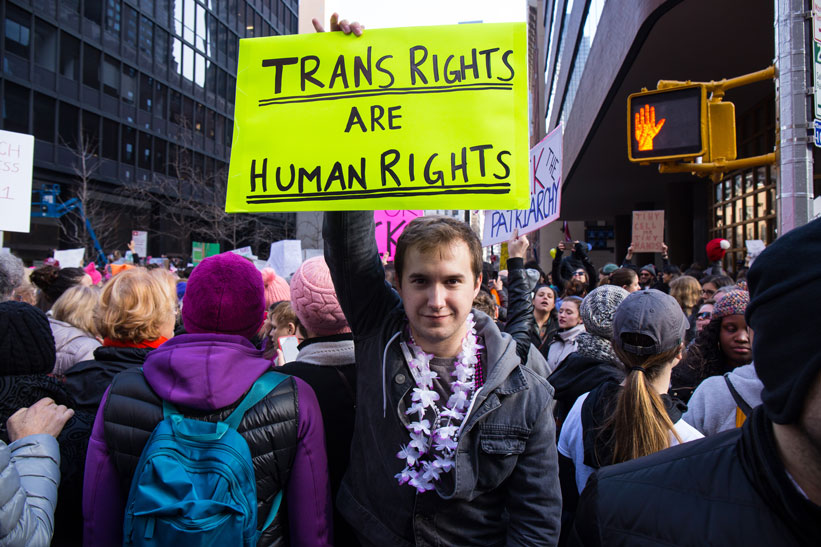Addiction is destroying the LGBTQ community. In fact, about 30% of LGBTQ people report abusing drugs and/or alcohol. Thanks to decades of research, we know LGBTQ people are more likely to suffer from addiction than their straight counterparts for a variety of reasons. These include the stress of being a minority, a lack of culturally-competent healthcare and being part of a culture that takes partying to the extreme.
But what we don’t know for sure is why transgender individuals suffer from addiction in even greater numbers than lesbians, gays and bisexuals.
Don’t believe it?
One study found that more than 25% of the trans population abused drugs and/or alcohol. And the rates are even higher when transgender youth are factored in. A 2017 study found that the “prevalence of substance use was 2.5-4 times higher for transgender youth compared with their non-transgender peers (depending on the substance).”
While more trans-specific research needs to be done, we can make some inferences as to why trans people struggle with substance abuse more than other members of the LGBTQ community.
Minority Stress Model
Any discussion looking at substance abuse in the LGBTQ community has to start with the Minority Stress Model. This model describes the persistent discrimination, marginalization and victimization people experience as a result of their minority status.
While all members of the LGBTQ community experience this form of stress to some degree, research shows that transgender individuals feel the effects even more strongly. That’s because they face not only external stressors, like stigma and discrimination, but also internal stressors, like gender dysphoria, that LGB individuals don’t necessarily deal with.
The stress of these external and internal factors often gets in the way of trans people’s ability to cope appropriately, regulate their emotions and develop positive relationships. As a result, they may develop traits like self-hatred and feelings of worthlessness. For many, drugs or alcohol provide relief from these negative emotions.
Discrimination

Discrimination is another reason behind addiction problems in the LGBTQ community. As with minority stress, most LGBTQ people experience discrimination at some point. However, transgender individuals experience it more often and more intensely.
In fact, a 2016 study from the National Center for Transgender Equality described the levels of discrimination trans people experience as “devastating” and present in “every aspect of life.”
Just look at these findings:
- 75% of transgender students felt unsafe at school because of their gender expression.
- 19% of trans adults were outright denied medical care because they were transgender or gender non-conforming.
- 17% of trans people surveyed had lost a job because of their gender identity or expression.
Given these statistics, and the real-life challenges they represent, it’s understandable why trans people might turn to drugs and alcohol to cope.

Co-Occurring Disorders
As with the two previous examples, co-occurring disorders like depression and anxiety contribute to substance abuse issues in the LGBTQ population. But as with the previous examples, rates of these disorders tend to be higher in trans people.
A 2009 study from the Massachusetts Department of Public Health illustrates this well. The study looked at the number of days people experienced depression and anxiety in the past month. They compared four groups: heterosexuals, gays/ lesbians, bisexuals and transgender.
Surprisingly, the gay/lesbian group had similar results to the heterosexual respondents, experiencing about four depressed days and eight anxious days in the past month. Unsurprisingly, trans people reported higher numbers, with an average of eight depressed days and eleven anxious days.
The study also found that 30.8% of transgender respondents had considered committing suicide at some point in their lives. Compare that to the gay/lesbian group where only 4.4% of respondents said the same.
Again, once the statistics are presented, the high rates of substance abuse in the transgender community start to make sense.
Family Rejection
Like with minority stress, discrimination, and co-occurring disorders, it’s clear family rejection is a problem affecting members of the LGBTQ community, especially trans individuals.
While the average age a lesbian or gay adolescent becomes homeless is 14.4, the average age a trans youth becomes homeless is 13.5. It may not seem like a huge difference, but it suggests that trans adolescents are more vulnerable than other sexual minority youth when it comes to family rejection.
And being rejected after coming out has direct consequences on substance abuse. A study from the Graduate Center of City University of New York found the higher the levels of family rejection, the greater the likelihood of drug or alcohol abuse.
Poverty
According to research from the Williams Group, one in five LGBTQ Americans lives in poverty, as compared to 15.7% of cisgendered straight respondents. This finding led the group to conclude that being LGBTQ increases the overall risk of poverty. The researchers also found that poverty risk differed within the community. Notably, transgender people were more vulnerable, with 29.4% indicating that they lived in poverty.
As a result of their economic disadvantage, many transgender people, especially transgender women, participate in risky behaviors like sex work and/or drug and alcohol abuse. One study found that 20% of transgender people had participated in this “underground economy” at some point in their lives.
These kinds of activities put transgender individuals at a greater risk of contracting HIV/AIDS than the general population. This is yet another source of mental health troubles that make substance abuse compulsions stronger in the transgender population.
Trans People Need Specialized Treatment
Given the varied and complex reasons behind addiction in the transgender community, addiction treatment has to be unique and specialized. Indeed, a study published in Substance Abuse Treatment, Prevention and Policy found that transgender individuals who experienced social rejection and violence left treatment prematurely.
At La Fuente Hollywood Treatment Center, we specialize in LGBTQ-affirmative care. And we believe in supporting our transgender clients in any way we can. That means not only treating addiction, but also helping them cope with discrimination and mental health issues underlying their substance abuse.
So if you, or someone you love, is transgender and is struggling with addiction, contact us today and let’s start your recovery journey.

[contact-form-7 id=”14454″ title=”Treatment Contact Form”]




